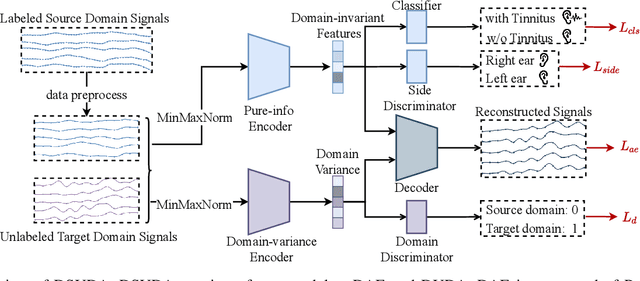Disentangled and Side-aware Unsupervised Domain Adaptation for Cross-dataset Subjective Tinnitus Diagnosis
Paper and Code
May 03, 2022



EEG-based tinnitus classification is a valuable tool for tinnitus diagnosis, research, and treatments. Most current works are limited to a single dataset where data patterns are similar. But EEG signals are highly non-stationary, resulting in model's poor generalization to new users, sessions or datasets. Thus, designing a model that can generalize to new datasets is beneficial and indispensable. To mitigate distribution discrepancy across datasets, we propose to achieve Disentangled and Side-aware Unsupervised Domain Adaptation (DSUDA) for cross-dataset tinnitus diagnosis. A disentangled auto-encoder is developed to decouple class-irrelevant information from the EEG signals to improve the classifying ability. The side-aware unsupervised domain adaptation module adapts the class-irrelevant information as domain variance to a new dataset and excludes the variance to obtain the class-distill features for the new dataset classification. It also align signals of left and right ears to overcome inherent EEG pattern difference. We compare DSUDA with state-of-the-art methods, and our model achieves significant improvements over competitors regarding comprehensive evaluation criteria. The results demonstrate our model can successfully generalize to a new dataset and effectively diagnose tinnitus.
 Add to Chrome
Add to Chrome Add to Firefox
Add to Firefox Add to Edge
Add to Edge